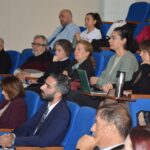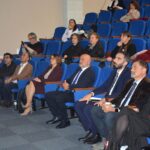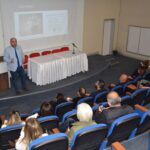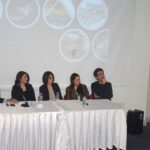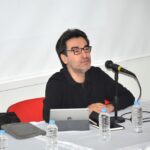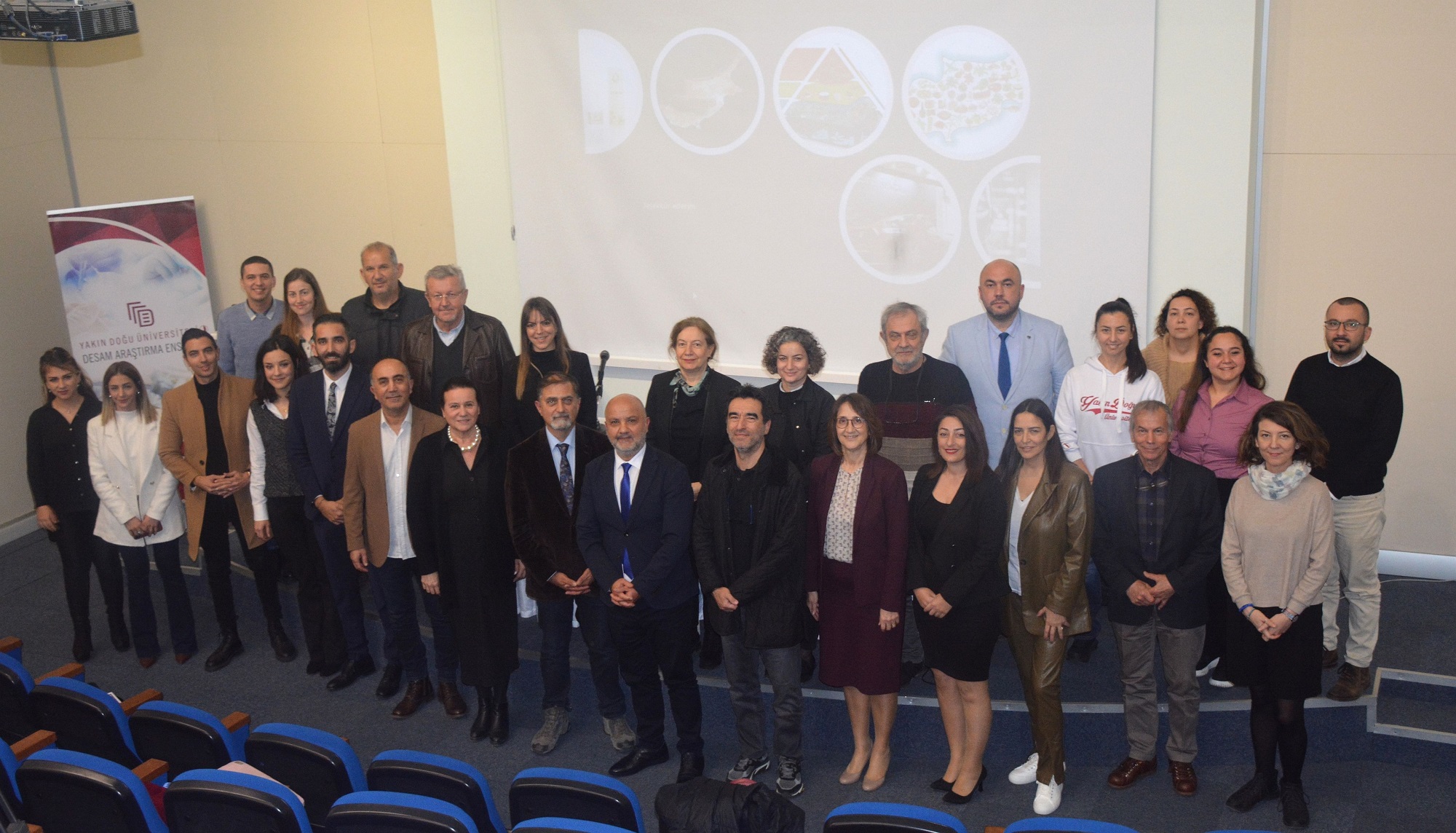
Postgraduate education is one of the most critical stages of training future scientists. In this process, advisors who mentor their students have a great impact on their academic success, research abilities and personal development. Advisors provide future academics with the academic guidance they provide; They help them identify research topics, develop methodology and direct the project, career planning, and integrate into academic and professional networks.
Near East University DESAM Research Institute discussed the academic mentoring process, which is a powerful tool to increase students’ academic success and personal development, with the “Mentoring Program 2024” event. Academicians showed great interest in the program organized with the participation of Sociologist and writer Prof. Dr. Besim Dellaloğlu. Near East University Rector Advisor and Near East University DESAM Institute Board Member Prof. Dr. Murat Sayan moderated the event consisting of two conferences.
The title of associate professor was born in the madrasah!
Participating in the “Mentoring Program 2024″ as an invited speaker, sociologist and writer Prof. Dr. Besim Dellaloğlu, gave a speech titled “Genealogy of the University; Yesterday, Today, Tomorrow”. Prof. Dellaloğlu stated that the first institution that is known and has an important place in the history of education is Plato’s Academy. Prof. Dr. Besim Dellaloğlu stated that the educational institutions that we call higher education today have also inherited this tradition.
Pointing out that Plato’s Academy stands out with courses that include philosophical discussions, mathematical studies and other scientific subjects, Prof. Dr. Besim Dellaloğlu stated that one of the most famous students of the Academy was Aristotle. He stated that this academy, which is considered a turning point in interest in philosophical thought and education, left a significant impact on the ancient world and beyond.
Prof. Dellaloğlu stated that with the rise of Abrahamic religions, academies closed down over time and were followed by madrasahs. Prof. Dr. Besim Dellaloğlu said that Greek philosophy texts were first translated into Syriac and then into Arabic, creating a madrasah tradition in the Middle East. Stating that the scholastic education in this developing process emerged, Prof. Dr. Besim Dellaloğlu also touched upon the term of scholastic; “The term of scholastic often has a dark or bigoted ring to it. But in fact, the word of scholastic is derived from skola, meaning ‘leisure time’. In ancient times, education and training were generally reserved for the upper classes. The concept of free time did not exist among slaves and lower classes.”
Research and innovation are essential in the modern age!
Stating that in the Middle Ages theological education and scholastic education overlap, Prof. Dr. Besim Dellaloğlu said that the reason for this is that theological education is given mainly with scholastic methods. Stating that scholastic education depends on classical books and is a rote learning method, Prof. Dr. Besim Dellaloğlu reminded that there was no printing press at that time and some books were memorized line by line. He stated that with this memorization method, even if the books are lost, they are at least kept in memory and in this respect, the rote method is also important. Prof. Dellaloğlu stated that the first diplomas, doctors and associate professor titles came from madrasahs. Dellaloğlu said that the name of the institution was not written on the diplomas, because, what was important was the names of the professors and the names of the books.
Prof. Dr. Dellaloğlu also stated that the term scholastic refers to the education and training provided in schools. Prof. Dr. Besim Dellaloğlu said, “This education was not limited to theology, but also offered education opportunities in many fields such as medicine and philosophy. However, modern science created an alternative to this traditional approach, and modern science replaced the scholastic tradition by influencing university education. With the modernization process, wider horizons have been opened in education, such as research and laboratories. For example, with modern science, the fact that the world is round has become indisputable.”
Stating that modern science includes not only the known but also the desire to discover the unknown, Prof. Dr. Besim Dellaloğlu emphasized that the education system should focus not only on transferring knowledge to students but also on developing critical thinking and research skills.
Guidance in the academic journey was discussed in many aspects
Following sociologist and writer Prof. Dr. Besim Dellaloğlu’s speech, in which he explained the transformation of universities throughout history, many issues that are important for the scientific world today were also discussed. At the first conference held within the scope of the program, Near East University Faculty of Law Lecturer Assist. Prof. Dr. Fatma Alaslan made a presentation on “Use Limits, Ethical and Legal Status of Artificial Intelligence and Data”, Near East University Dean of Students Prof. Dudu Özkum Yavuz on “Mobbing in Higher Education”, NERITA Senior Technology Transfer Specialist Şefik Emre Coşkun on “21st Century Competencies and Leadership”, Near East University DESAM Founding Member and Scientific Research Projects Coordinator Prof. Dr. H. Seda Vatansever on “Limits and Requirements of Thesis Consultancy”, Near East University Rector’s Advisor and Near East University DESAM Institute Board Member Prof. Dr. Murat Sayan on “Perspective on Good and Open Science Infrastructure”. In the second conference, Near East University NERITA President Prof. Dr. Murat Özgören made the presentation titled “A Look at the World of the Future”. Following the question and answer session after the presentations, Near East University Rector Prof. Dr. Tamer Şanlıdağ presented a certificate of appreciation to the participants.
Prof. Dr. Tamer Şanlıdağ: “The mentoring process is an important process that guides the development of academics.”
Emphasizing that today universities take an important responsibility in leading social progress with the scientific research and studies they carry out, and in educating the professionals needed by the society, Near East University Rector Prof. Dr. Tamer Şanlıdağ said, “In addition to this responsibility, training scientists who will maintain scientific continuity is one of the most important missions of universities.” Stating that Near East University is an important “school” in this respect, Prof. Dr. Şanlıdağ said, “The Mentoring Program 2024 event we organized created a very beneficial discussion platform with the topics discussed.”
Prof. Dr. Prof. Tamer Şanlıdağ thanked all participants, especially to Prof. Dr. Besim Dellaloğlu and said, “The eye-opening results of the Mentoring Program 2024 event gave all participants a different perspective and awareness.”
Prof. Dr. Murat Sayan: “Graduate education is an extremely critical stage for a sustainable scientific future.”
Near East University Rector’s Advisor and Near East University DESAM Institute Board Member Prof. Dr. Murat Sayan, who moderated the Mentoring Program 2024 event, said, “Postgraduate education is an extremely critical stage for a sustainable scientific future. In this process, raising targets and quality is a must for the entire scientific world. In he Mentoring Program 2024 event we organized, we discussed very important issues that will form the basis for this quality increase.”
Prof. Dr. Sayan emphasized that the number of articles is important, but the quality of these articles is much more important, and that it is also important to know the right journals and publish your doctoral thesis in a good journal.
Prof. Dr. Murat Sayan stated that it is necessary to know the magazines and publishing houses while mentoring and said, “We do not have to be librarians. But we have to constantly research and stay up to date. While the citation rate is generally high in a journal with a large number of publications, the number of citations in journals with few publications is generally low. That’s why it’s important to know publishing houses and magazines.” Prof. Dr. Sayan also touched upon the importance of the sources in the articles and emphasized that there are various ways for this control. Prof. Dr. Murat Sayan stated that poor management of the referee process can also lead to major problems and said, “Institutions can provide support to referee evaluation processes. For this; “Solutions such as improving the referee pool and increasing the use of artificial intelligence can be offered.”
